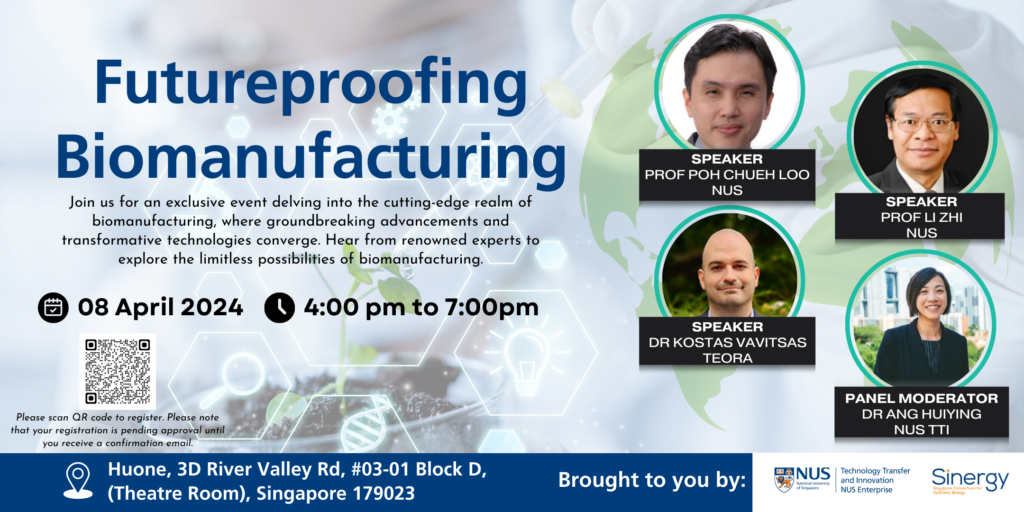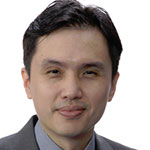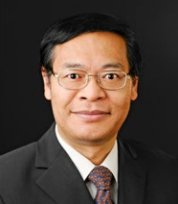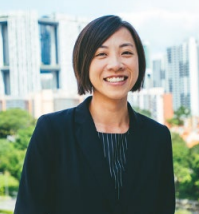
Futureproofing Biomanufacturing
At the intersection of Biology and Chemical Engineering we can find today’s best chance to replace humanity’s reliance on petrochemicals: Biomanufacturing. It is a way to use living organisms to create compounds that we commonly get from petroleum. Thanks to breakthroughs in discovering pathways, genetic engineering, and bioprocessing, we can leverage Synthetic Biology to tweak microorganisms, figure out how they work, and optimize them to produce large amounts of useful substances. This opens the door to a future where biomanufacturing could help us achieve sustainable development goals and offer a genuinely earth-friendly alternative to non-renewable resources.
Join us for an exclusive event delving into the cutting-edge realm of biomanufacturing, where groundbreaking advancements and transformative technologies converge. Hear from renowned experts to explore the limitless possibilities of biomanufacturing. Engage in thought-provoking discussions on the latest advancements and challenges in the field. Connect with peers, industry leaders, and potential collaborators.
Save the date: 8th April 4pm – 7pm
Venue: Huone, 3D River Valley Rd, #03-01 Block D, Singapore 179023
Event Agenda
16.00: Welcome from Dr Eugene See, Sinergy CMO Director and Dr Koh Shuwen, NUS TTI Director
16.15: Biology’s New Frontier: How Tiny Sensors and Smart Screening Are Changing the World
16:35: The Future of Green Synthesis: Bioproduction of Fine Chemicals via Biocatalysis
16:55: Harnessing synthetic biology and bioinformatics for sustainable disease management in aquaculture
17.15: Panel Discussion: Futureproofing Biomanufacturing
18.00: Refreshments and Networking
Speakers

Poh Chueh Loo, Associate Professor
Department of Biomedical Engineering, National University of Singapore
Professor Poh obtained a PhD in Bioengineering from Imperial College London, UK and a Bachelor of Engineering (Electrical & Electronic) with Honours (First Class) from Nanyang Technological University (NTU), Singapore. Professor Poh is interested in the development of new tools for synthetic biology and in the use of a model-based approach for biodesign.
Biology’s New Frontier: How Tiny Sensors and Smart Screening Are Changing the World
Biosensors, traditionally based on antibodies or enzymes, are getting a synthetic biology upgrade. Engineered proteins with designer binding pockets can now detect specific molecules with unparalleled precision, making them ideal for ultrasensitive disease diagnosis or environmental monitoring. Imagine sensors so tiny they fit on a chip, sniffing out diseases in mere seconds.
High Throughput Screening, or HTS, the engine of drug discovery, is also being supercharged by synthetic biology. Living cells, programmed with custom-built genetic circuits, can become miniature drug-testing factories. By measuring their response to thousands of compounds simultaneously, researchers can rapidly identify promising drug candidates. This not only slashes development times but also allows for the exploration of entirely new avenues in medicine, targeting diseases once considered untreatable.

Zhi Li, Associate Professor
Department of Chemical and Biomolecular Engineering, National University of Singapore
Prof. Li Zhi received B.Sc. in chemistry from Nanjing University in 1982, M. Eng. in chemical engineering from Chinese Academy of Forestry in 1985, and Ph.D. in organic chemistry from the University of Vienna in 1991. He then worked at the Swiss Federal Institute (ETH) Zurich in the Laboratory of Organic Chemistry as a postdoc and in the Institute of Biotechnology as a group leader. In 2006 he moved to National University of Singapore as an associate professor at the Department of Chemical and Biomolecular Engineering. He was a fellow of the Singapore-MIT Alliance (2006–2015). His research focuses on biocatalysis for chemical synthesis, especially for enantioselective synthesis and green pharmaceutical manufacturing; bio-based chemical and fuel production; and polymeric biomaterials. His expertise in biocatalysis includes enzyme discovery and evolution, cascade biotransformations, enzyme immobilization, biotransformations in vivo and in vitro, and bioprocess development. He received Singapore Award for Sustainable Technology from IChemE (2013) and Achievement Award from Bioenergy Society of Singapore (2018).
The Future of Green Synthesis: Bioproduction of Fine Chemicals via Biocatalysis
Biomanufacturing of high-value products, such as fine chemicals, through biocatalysis provides with green, sustainable, and efficient alternatives to traditional chemical syntheses, with many commercialized examples in chemical and pharmaceutical industries. Key challenges for the successful development of the bioprocesses include the engineering of suitable enzymes and enzymatic reactions. We recently developed several applicable bioprocesses based on enzyme engineering via evolution and reaction engineering via biocascades design. Some representative examples will be addresses in this presentation, including bioproduction of high-value chiral chemicals (diols, acids, amines, alcohols, amino alcohols, amino acids, hydroxyacids, etc) from simple starting materials (alkenes, epoxides, etc).

Kostas Vavitsas, Deputy Program Director
TeOra
Kostas Vavitsas is Deputy Program Director at TeOra, a Singapore startup using cutting edge technology to provide disease management solutions for aquaculture. He holds a PhD in Biotechnology from the University of Copenhagen, and he has conducted research in Australia, Greece, Denmark, and Sweden. He was previously heading Singapore’s Consortium for Synthetic Biology and he is a well-regarded member of the global Synthetic Biology Community.
Harnessing synthetic biology and bioinformatics for sustainable disease management in aquaculture
One in three calories in aquaculture are lost to disease. However, disease management solutions in hatcheries and farms are limited, where limited vaccination, antibiotics, pesticides, and biological control remain unable to prevent losses that can reach up to 90% of the grown fish or shrimp. TeOra aims to revolutionize disease management in aquaculture, using cutting-edge synthetic biology and bioinformatics. Our programmable platform can biomanufacture prophylactic and therapeutic solutions, customized to individual disease for multiple fishes and shrimps. We offer a solution that is easy to store, simple in use, and cost-competitive. We will showcase how our technology was successfully deployed for disease management in shrimps, and will offer a glimpse on our product pipeline. Inspired by Singapore’s 30 by 30 vision, we aim our products to contribute to the sustainability of the aquaculture industry, in food security, and in managing disease challenges with a wide spectrum of customizable solutions. We envision Singapore leading the way for aquaculture sustainability and TeOra will be a part of this success.

Panel Moderator: Huiying Ang, Associate Director
Technology Transfer & Innovation, NUS Enterprise
Huiying Ang is an associate director in NUS Technology Transfer and Innovation (TTI) office and an adjunct assistant professor with the department of biomedical engineering. She completed her Ph.D in Materials Science and Engineering and was the MedTech Lead at National Heart Centre Singapore for 6 years before joining NUS. She has extensive background in medical device research and innovation, in-depth training in design thinking and deep tech translation. At NUS TTI, she is part of a team that leads the charge in commercialisation of NUS health technologies portfolio. Huiying works closely with researchers and healthcare start-ups to transform scientific innovations into real-world solutions. She maintains close collaborations with key stakeholders in the medtech ecosystem, forging connections between academia, investors and industry.
About TTI, NUS Enterprise
Technology Transfer and Innovation (TTI), NUS Enterprise is the technology translation and commercialisation arm of the National University of Singapore (NUS). Over the last five years, TTI has played a pivotal role in getting more than 760 patents granted and more than 120 technology-based companies spun off from the NUS.
Through innovation programmes delivered in a customer-centric manner, TTI provides funding, connections and expertise to students, researchers and professors, whether they are seeking to create a spin off company or partner with established industry players to translate their innovations into the marketplace.
The TTI team comprises of technical, business and legal expertise that commercialises any technology-based opportunities.



